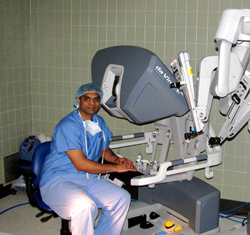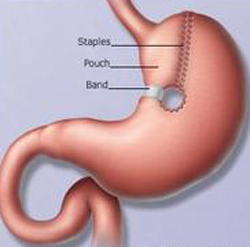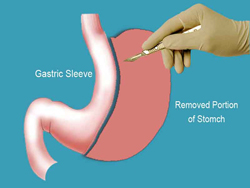Weight Loss Surgeries Providing Hope for Morbidly Obese Patients at Memorial
By Mike Hudson
 |
CDr. Bala Thatigotla |
 |
Restrictive Gastric Surgery |
 |
Gastric Sleeve Surgery |
 |
For the morbidly obese, those whose body weight is 30 percent or more than what would be expected for their height and sex, life is often nothing at all like a box of chocolates. They always know what they’re going to get next.
They lose their social life, their self respect and self-image. They turn in poor performance at work and they get laid off. Their spouses leave them for someone in better shape. When you speak to them, they cry because they’re so used to people not talking to them.
And the social aspects take a backseat to the myriad medical problems associated with morbid obesity.
Some patients can’t even leave their bed. It cuts down their lifespan by 10 years or more. Morbid obesity affects every organ system of the body. Patients have unending headaches because of the constant pressure in the brain. It affects their breathing because the lungs can’t stand the pressure of being obese. They go into lung failure and cardiac failure because of stress on the heart. They are at risk for heart disease and heart attacks and heart failure.
The condition increases the risk of acid reflux disease, which causes an increased risk of cancer in the esophagus. It increases risk of gastric ulcers and increases the problems with the urinary tract. Many morbidly obese people have stress incontinence where they cannot control their urine. It can cause infertility and, with age, the joints simply can’t bear the weight and become worn out.
Even if they go for a joint replacement, over time the replacement gets worn out and fails. It causes blood pooling in the legs, which can cause clots. It is a silent killer and it affects every part of the body.
It’s not a pretty picture. And that’s where the bariatrics program at Niagara Falls Memorial Medical Center comes in.
Bariatrics is the medical term for weight loss surgeries. And that is basically for someone who is morbidly obese. Where diet and exercise programs fail, and where weight loss drugs aren’t getting the job done, bariatric surgery can often be the answer.
And here in Niagara Falls, where morbid obesity is a way of life for many pizza and chicken-wing eating residents, we are blessed with one of the top bariatric surgery units in the Tri-state region, a unit headed up by Dr. Bala Thatigotla.
“Right now it’s a new program, and there has been a lot of effort put in,” Dr. Bala told the Niagara Falls Reporter. “It’s not like if you say you want to start the program we can start you tomorrow. It involves a comprehensive team approach that includes the physicians, the coordinator, the trained nurses, the anesthesiologists, nutritionists, behavioral health specialists, psychiatrists, endocrinologists and exercise physiologists, too.”
Broadly speaking, there are two types of surgeries performed by Dr. Bala and his trained team of experts. In the first, the amount of food the patients can eat is restricted and, in the second, the stomach is essentially bypassed so that the food cannot be absorbed and turned into fat.
Restrictive surgeries, which make use of a band around the stomach, work by physically restricting the size of the stomach and slowing down digestion. A normal stomach can hold about 3 pints of food. After surgery, the stomach may at first hold as little as an ounce, although later that could stretch to 2 or 3 ounces. The smaller the stomach, the less you can eat. The less you eat the more weight you lose.
In the bypass or sleeve operation, which is usually done with a laparoscope, about 75 percent of the stomach is removed. What remains of the stomach is a narrow, banana- shaped tube or sleeve, which connects to the intestines.
Depending on the method used, patients begin to see weight loss from two weeks to two months after the surgery, with maximum weight loss occurring after about a year.
For all intents and purposes, the surgeries are irreversible, Dr. Bala said.
“They become healthy because of the tool. If you take the tool away, they are going to get to the same place where they were,” he said. “So I tell the patients when they come to the seminar, if they are thinking of reversing this later they shouldn’t put themselves through the risk of the surgery. They are just going to put back on every pound they have lost.”
Health insurance plans have generally been very receptive to the weight loss surgeries, Dr. Bala said.
“We can’t complain about that and, for them over the long term, these procedures represent a cost savings,” he said. “The weight loss issue controls a lot of major health problems; it controls the diabetes, it controls the hypertension, it controls the sleep problems, it takes away the psychiatric issues, infertility problems, the long term need for joint replacement. So what the insurance is paying for the surgery is paid off in 2 years from the savings associated with the other related health care issues.”
Obviously any surgery has its own risks. But right now the risks are so low that the benefits are more than worth it for the surgeries. The risk of dying, of other infections, of leaks are all there, but the team at Niagara Falls Memorial Medical Center has the sort of protocol in place to catch up the risk factors earlier and deal with them.
“So we have the capability to identify the risk factor early and deal with it appropriately,” Dr. Bala said.
Broken marriages, lost employment opportunities, heart attacks, lung failure and cancer. Clearly, the life of the morbidly obese is no picnic.
But for those suffering from the condition here in Niagara County, and having the desire to do something about it, Niagara Falls Memorial Medical Center is offering the latest in technology and a staff of doctors and treatment specialists who know how to use it.